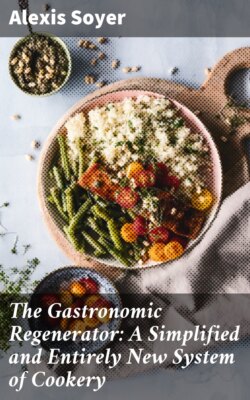Читать книгу The Gastronomic Regenerator: A Simplified and Entirely New System of Cookery - Soyer Alexis - Страница 17
На сайте Литреса книга снята с продажи.
HOW EVERYTHING SHOULD BE IN COOKING.
ОглавлениеTable of Contents
All clear soup must not be too strong of meat, and must be of a light brown, sherry, or straw colour.
All white or brown thick soups must be rather thinnish, lightly adhering to the back of the spoon.
All purées must adhere little more to the back of the spoon.
Any Italian paste must be very clear, rather strong, and the colour of pale sherry.
All kinds of fish sauce should be thicker for boiled fish than for broiled or fried.
Brown sauce should be a little thinnish and the colour of a horse-chesnut.
White sauce should be of the colour of ivory, and thicker than brown sauce.
Cream, or Dutch sauce, must be rather thick, and cannot be too white.
Demi-glace requires to be rather thin, but yet sufficiently reduced to envelope any pieces of meat, game, poultry, &c., with which it is served.
Every description of fish should be well done, but not over-boiled, broiled, stewed, or fried.
Beef and mutton must be underdone even for joints, removes, and entrees.
Lamb requires to be more done.
Veal and pork must be well done.
Venison must be underdone, red in the middle, and full of gravy, but not raw.
Poultry, either broiled, stewed, boiled, or roasted, must be done thoroughly, not cutting in the least red, but must be still full of gravy.
Pheasants and partridges must be well done through, yet full of gravy.
Grouse, black cocks, gray hens, and ptarmigans, must cut reddish, with plenty of gravy, but not too much underdone.
All kinds of water-fowl must be very much underdone, so that the blood and gravy follow the knife in carving.
Plovers must be rather underdone, but done through.
Rabbits and pigeons must be well done.
Second-course savoury dishes must be rather highly seasoned, but with a little moderation.
Pastry should, when baked, be clear, light, and transparent, and of a beautiful straw colour; the body of a croustade the same.
Large pies, timbales, and casseroles of rice must be of a yellowish brown colour.
Jellies require to be rather white and transparent for fruits, and not too firm, but better so than too delicate.
Orange jellies should be of a deep orange colour, and all fruit jellies as near as possible to the colour of the fruit.
Creams should be very light and delicate, but fruit creams must be kept of the colour of the fruits they are made of.
For all the demi-glacé removes the ice must be firm, but not the least hard.
All kinds of soufflé or fondu must be well done through, or they would be very indigestible, clog the delicate palate, and prevent the degustation of the generous claret which flows so freely after dinner on the table of the real epicure.
I recommend sugar in almost all savoury dishes, as it greatly facilitates digestion and invigorates the palate, but always increase or diminish the quantity according to the taste of your employer.
I often introduce onions, eschalots, or even a little garlic in some of my most delicate dishes, but so well blended with other flavours that I never have a single objection even by those who have a great dislike to it.
Horseradish and herbs of every description may always be used with discretion to great advantage.
Contrary to the expressed opinion of every other previous publication, I say that too much seasoning is preferable to too little, as your employer can correct you by saying there is too much of this or that, and you can soon get it to his taste; but while you fear over-seasoning you produce no flavour at all; by allowing each guest to season for himself, your sauce attains a diversity of flavours. The cook must season for the guest, not the guest for the cook.
I have always found great advantage in dressing the greatest part of my entrées on a thin roll of mashed potatoes;[2] this has never been found objectionable, as it is so thin that it is imperceptible when covered with the sauces, and serves to prevent any entrées dressed in crown from being upset, before going on table, by the carelessness of the servant; for large removes, as turkey à la Nelson (No. 510), &c., after forming the ship (see engraving), egg, bread-crumb, and set in a moderate oven to brown, fix in your croustade, and dish up; the potatoes may be eaten, but not the croustade, which is merely an embellishment. Borders may also be made of forcemeat, as for ris de veau (No. 673), but gives much more trouble without being better; also of rice, by preparing it as for casserole au riz (p. 260); it may be used as mashed potatoes. Make but few preserves, only those that are indispensable; you will have a continual enjoyment of earlier stock, as Nature closely watches our wants and liberally supplies our wishes. The real gourmet, though anxious to produce novelty, never attempts to over-force the produce of the various seasons.
